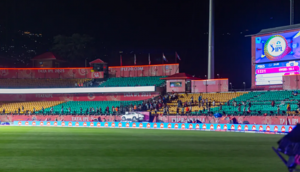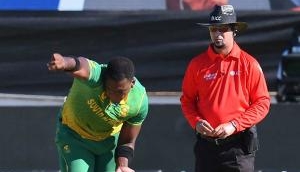
With all eyes on the prestigious ICC World T20 scheduled in March, some of Asia's biggest cricketing giants will gear up for a dress-rehearsal as they renew their subcontinent rivalry in the Asia Cup slated to begin on 24 February in Bangladesh.
The 13th edition of the tournament - also the fifth to be held in Bangladesh - will be played in the shortest format for the very first time in its 32-year history.
The tournament will also act a springboard for the Asian giants who will be eager to get their combinations right ahead of the all-important World T20.
Along with Bangladesh (the hosts) and Sri Lanka (the defending champions), the Asia Cup will also feature arch-rivals India and Pakistan who have not played each other since last year's World Cup.
The tournament will also feature one ICC Associate Member that will be determined through a qualifying round to be played between Afghanistan, Hong Kong, Oman and United Arab Emirates (UAE) from 19-22 February.
The Lankan brigade, which is currently tied at five Asia Cup titles with India, will have a chance to clinch their record sixth title in this edition. On the other hand, India will also be oozing with confidence following their recent T20 success against Australia and Sri Lanka.
As the Asian teams gear up to lock horns in the upcoming tournament, here's a look at the brief history of Asia Cup:
1984
Following the establishment of the Asian Cricket Council (ACC) as a measure to promote goodwill between the Asian countries in 1983, the first edition of the Rothmans Asia Cup was held in Sharjah, UAE in 1984.
The round-robin tournament was contested between India, Sri Lanka and Pakistan. It was won by India who registered two wins, while Sri Lanka turned out to be the runners-up with one victory. Pakistan went home without winning a single match.
1986
The second edition of Asia Cup was held in Sri Lanka in 1986. It was also the first multi-national cricket series to be held in the island nation. Following a controversial series against Lanka in 1985, India decided to skip the tournament due to soured cricketing relations with the hosts.
India's absence paved the way for Bangladesh to feature in the tournament for the very first time. In the final, Sri Lanka got the better of Pakistan to clinch their maiden Asia Cup title.
1987
Bangladesh got the opportunity to host the third edition of the Asia Cup in 1987. Just like Sri Lanka, it was also the first-time that a multi-national cricket tournament was being held in Bangladesh.
The final was contested between Sri Lanka and India with the latter claiming a six-wicket victory to win their second Asia Cup title.
1990
India got its own taste of the Asia Cup when they were selected to host the fourth edition of the tournament in 1990. The event, once again, saw another team pull out due to severed cricket ties with the hosts.
The Pakistan cricket team decided against traveling to India for the tournament following strained political relations between the two countries. The final was played between India and Sri Lanka where a hat-trick from Kapil Dev led the hosts to their third Asia Cup title.
1995
After the 1993 edition was cancelled due to the political spat between India and Pakistan, the fifth version of the Asia Cup took the series back to Sharjah, UAE after 11 years. Following the preliminary round, three teams - India, Sri Lanka and Pakistan - found themselves tied on points for the first time in the history off the tournament.
However, the superior run-rates propelled India and Sri Lanka into the final ahead of Pakistan. The final turned out to be a usual affair for India who defeated the Lankans for the third time in succession. It was also India's fourth Asia Cup title.
1997
The sixth edition of the tournament was held in Sri Lanka in 1997. Having won the coveted World Cup the previous year, the Lankans were the favourites to win the tournament, being held in their backyard.
The final turned out to be a nightmare for the Indians as they suffered a crushing eight-wicket loss at the hands of Sri Lanka, who finally managed to win their second title after 11 years.
2000
Bangladesh was selected to host the Asia Cup for the second time in 2000. The seventh edition of the tournament turned out rather unfortunate for the Indians - who won just a single game and did not qualify for the final for the very first time in the history of the tournament.
Pakistan, who were unbeaten throughout the tournament, were clearly the favourites against Sri Lanka in the final. The Moin Khan-led team came out on top with a 39-run win over the Lankans. After waiting for 16 years, Pakistan deservedly clinched their maiden Asia Cup title.
2004
The eighth edition of the Asia Cup was delayed by two years and was finally held in Sri Lanka in 2004. The tournament witnessed a complete change in its format with the introduction of three stages - the Group Stage, the round-robin Super Four and the final.
Apart from the format, the tournament also saw the introduction of other Asian teams like UAE and Hong Kong for the first time.
Bangladesh had the distinction of reaching the second stage of a major tournament for the first time, but a dismal performance in the Super Four led to their elimination.
India and Sri Lanka topped the Super Four stage to seal their final berth. The Lankans produced a clinical performance to outwit the Indian team and won the final by 25 runs. It was Sri Lanka's third Asia Cup title - all of them coming at home.
2008
After the 1993 edition was cancelled, Pakistan finally managed to host the Asia Cup for the first time in 24 years. In Group B, India came out on top and entered the Super Four stage with Pakistan in second place. Sri Lanka and India topped the Super Four stage and sealed their berth for the final.
Riding on Sanath Jayasuriya's quickfire 125 and Ajantha Mendis' spell of 6/13, Sri Lanka won the final by 100 runs - the biggest margin recorded in any Asia Cup final till date. It was Sri Lanka's fourth Asia Cup title, also their first outside home.
2010
Sri Lanka hosted the tenth edition of the Asia Cup which featured only the four Test playing Asian nations. All of the seven matches, including the final, were held at one single venue - Dambulla.
India and Sri Lanka once again found themselves in fray of the Asia Cup title when the two giants topped the group stage and secured their berth for the final. Sri Lanka, for the first time, lost a final at home when India romped to a 81-run win to secure a record fifth Asia Cup title.
2012
The eleventh edition of the Asia Cup was held in Dhaka, Bangladesh in 2012. The tournament saw a spirited performance from the home team that defeated both India and Sri Lanka to book its place in the final for the first time in the history of the tournament.
However, the hosts suffered a heart-breaking two-run loss at the hands of Pakistan in the nail-biting final. It was the second Asia Cup title for Pakistan and Misbah-ul-Haq became only the second captain after Moin Khan to win the tournament for his country.
2014
The twelfth and most-recent edition of the Asia Cup was held in Bangladesh. Since it inception in 1984, the tournament was contested between five teams with Afghanistan becoming the seventh team to feature in Asia Cup.
The final was contested between Sri Lanka and Pakistan at the Sher-e-Bangla stadium in Mirpur. The Lankans came out on top in the final and defeated Pakistan by five wickets following the heroics of Lasith Malinga (5/56) and Lahiru Thirimanne (101). The victory also helped Sri Lanka to equal India's five Asia Cup title wins.








![BJP's Kapil Mishra recreates Shankar Mahadevan’s ‘Breathless’ song to highlight Delhi pollution [WATCH] BJP's Kapil Mishra recreates Shankar Mahadevan’s ‘Breathless’ song to highlight Delhi pollution [WATCH]](https://images.catchnews.com/upload/2022/11/03/kapil-mishra_240884_300x172.png)

![Anupam Kher shares pictures of his toned body on 67th birthday [MUST SEE] Anupam Kher shares pictures of his toned body on 67th birthday [MUST SEE]](https://images.catchnews.com/upload/2022/03/07/Anupam_kher_231145_300x172.jpg)






